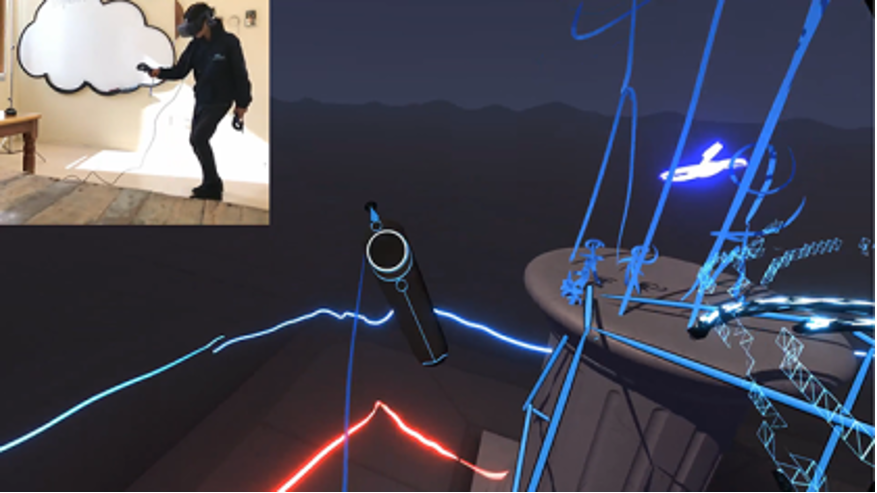A floating city, fueled by methane gas, with a vegetable garden full of ripe asparagus and melons––if a city in the sky sounds out of this world, that’s because it is. At UCSB Gevirtz School’s McEnroe Reading Clinic, researchers are using virtual reality to elevate voices of youth who can become advocates for positive change through education that allows them to unleash their imaginations. The central thrust of this investigation is to determine how virtual reality could be used to foster literacy skill development among multilingual learners who often lack opportunities to use their knowledge and expertise in educational settings. Now, funded by a Dr. Seuss Foundation Grant, and using Oculus VR headsets donated by Meta Labs, Faculty Director Diana Arya and the rest of the Community Based Literacies (CBL) VR team hope to take their research further in a project entitled “Transformative Potential of Virtual Reality for Reimagining Literacy Instruction.”
Since its inception in spring 2019, Dr. Arya has led a multi-year study in the the McEnroe Reading Clinic’s Virtual Reality Literacy Lab involving multilingual learners who have demonstrated difficulties or disabilities associated with literacy. This VR team includes a core group of multilingual graduate students (David Sañosa, Honeiah Karimi, Dogukan Ozgen, and Hui Zhang) who have key coordination roles in the current project and offer peer mentoring support to undergraduates who support the programming, planning and instructional sessions with youth participants. The Clinic is also supported by a diverse team of interdisciplinary scholars who serve as advisors to research initiatives like the VR Lab; members include Department of Education faculty Richard Durán and Dorothy Chun, and affiliated faculty member from the Department of Computer Science, Richert Wang.
Using Occulus virtual reality (VR) headsets generously supplied by Meta, the Clinic provides elementary and middle school children with first-hand experiences and multi-media story-building opportunities they would not otherwise have. From discovering underwater kelp forests to exploring outer space, the Clinic’s young learners experience a variety of worlds full of high levels of interactivity, inspiration and agency – necessary ingredients for students to develop literacy-related knowledge and skills required for postsecondary readiness. For students who struggle with traditional remedial activities like flashcards and worksheets, VR is a transformative tool that positions the learner as an active investigator, storyteller and even an activist.
“VR programming offers students a chance to learn about complex ecosystems in a virtual space and explore how they can create sustainable solutions,” explains Dr. Arya. In addition to strengthening core competencies, research indicates that students who view themselves as problem solvers are more likely to pursue educational opportunities after high school.
Through this hands-on approach to learning literacy, the participants’ only limit is their own imagination. “Our approach is to leverage VR by immersing players in a rich context for language use that involves self-directed interaction and gameplay,” says Department of Education doctoral student Honeiah Karimi, who works as a data analyst for the clinic’s VR Lab. “We can invite players to literacy in a different way and expand the possibilities for play, expression and communication.”
Besides their imagination, participants can also use virtual reality to immerse themselves in real-life experiences. VR can transport a child back to memorable locations and help them engage with writing prompts about their memories associated with that place. For one such participant, this looked like restructuring a visit to the Golden Temple in India.
Collaboration is a key aspect of the Clinic’s approach to teaching literacy. One lesson involves the use of virtual escape rooms, where participants are free to act on their own but must work together to beat the game. “This creates an authentic context for students to think, ‘I have a task, and I can’t do it without collaborating with my peers,’” says Karimi.
Qualitative video analysis of exploratory sessions reveals that children who participated in these collaborative, creative activities were able to communicate with drawings and use their whole body to interact with phenomena. These results overwhelmingly support the Community Based Literacies teams’ core values of agency, co-learnership and belonging. With 30 new headsets from Meta Labs, and an infusion of grant funds from the Dr. Seuss Foundation, the McEnroe Reading Clinic hopes to provide more students with the opportunity to practice literacy skills in a space where even the sky is no limit to their imaginations.
